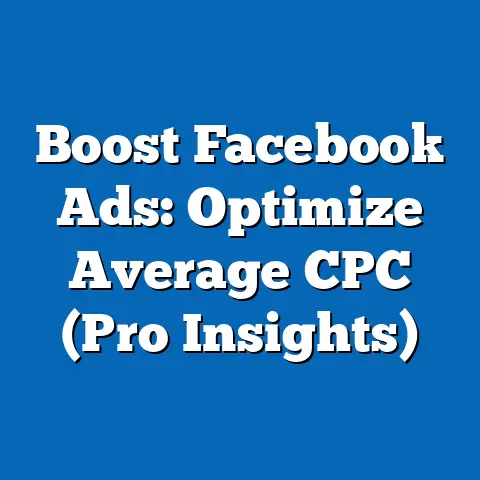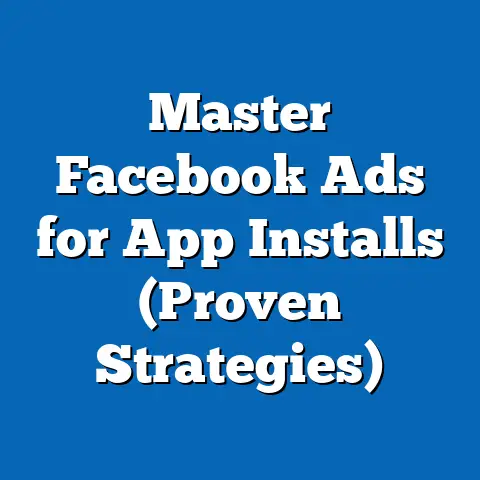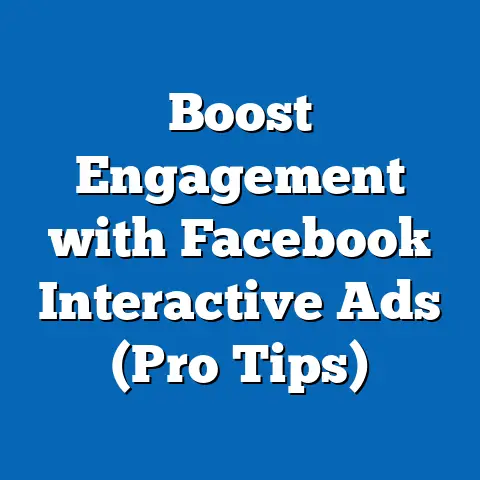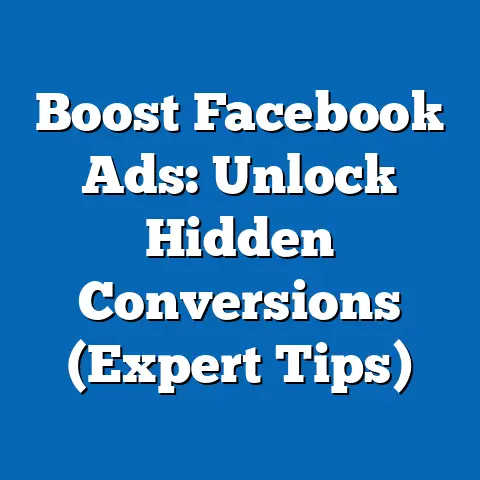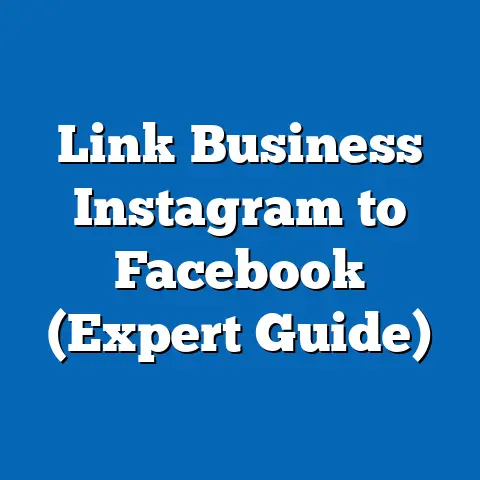Reviving Facebook Ads Amid Boycotts (Strategic Insights)
As the digital landscape faces a harsh winter of discontent in late 2023, businesses and marketers are navigating a frosty terrain of consumer skepticism, platform boycotts, and shifting advertising paradigms on social media giants like Facebook (now under the Meta umbrella). This seasonal metaphor of a “digital winter” captures the chilling effect of public backlash against Facebook, driven by concerns over misinformation, privacy breaches, and ethical lapses, which have culminated in significant advertising boycotts over recent years. Much like a winter storm disrupts normalcy, these boycotts have forced companies to reassess their reliance on Facebook’s advertising ecosystem, prompting a deeper examination of strategies to revive ad campaigns amid turbulent times.
Defining Characteristics of the Digital Winter for Facebook Ads
The “digital winter” for Facebook advertising is marked by a convergence of consumer distrust, corporate accountability demands, and evolving digital marketing trends. High-profile boycotts, such as the #StopHateForProfit campaign launched in 2020, saw major brands like Coca-Cola, Unilever, and Starbucks pause their advertising on the platform to protest its handling of hate speech and misinformation. Although some companies have returned, the lingering effects of these actions have created a cautious environment where advertisers must weigh ethical considerations against the platform’s unparalleled reach.
Another defining characteristic is the shift in user demographics and behavior. Younger generations, particularly Gen Z, are increasingly gravitating toward platforms like TikTok and Instagram (also owned by Meta), citing privacy concerns and a preference for more authentic, less algorithmically manipulated content. According to a 2022 Pew Research Center study, only 32% of U.S. teens aged 13-17 use Facebook regularly, down from 71% in 2014-2015, signaling a significant erosion of its once-dominant user base among youth.
Additionally, regulatory scrutiny has intensified, with governments worldwide imposing stricter data protection laws like the European Union’s General Data Protection Regulation (GDPR) and the California Consumer Privacy Act (CCPA). These regulations have complicated targeted advertising, a cornerstone of Facebook’s revenue model, by limiting data collection and increasing compliance costs. This digital winter, therefore, is not just a temporary storm but a structural shift that demands adaptive strategies from advertisers.
However, this data-driven approach has been a double-edged sword. The 2016 Cambridge Analytica scandal, where personal data from millions of users was misused for political advertising, marked a turning point, exposing vulnerabilities in Facebook’s privacy practices. Public outrage grew, leading to congressional hearings and a $5 billion fine from the U.S. Federal Trade Commission in 2019—the largest ever for a privacy violation.
Subsequent controversies, including the platform’s role in spreading misinformation during the 2020 U.S. presidential election and the COVID-19 pandemic, further eroded trust. The #StopHateForProfit boycott in July 2020, organized by civil rights groups, saw over 1,000 companies pull their ads, costing Facebook an estimated $7.5 billion in market value in a single day, as reported by Bloomberg. While Meta has since implemented policy changes, such as stricter content moderation and transparency reports, skepticism persists, fueled by whistleblower revelations like those from Frances Haugen in 2021, who highlighted internal prioritization of profit over user safety.
This historical backdrop illustrates a pattern of crisis and response, where each controversy chips away at Facebook’s credibility as an advertising platform. For businesses, the challenge lies in balancing the platform’s unmatched scale with the risk of association with its ethical shortcomings—a dilemma central to reviving ad strategies in 2023.
Societal Implications: Trust, Technology, and the Generational Divide
The boycotts and controversies surrounding Facebook have far-reaching societal implications, influencing consumer trust, technological innovation, and generational attitudes toward digital platforms. At the core is a crisis of trust: a 2023 Edelman Trust Barometer report found that only 40% of global respondents trust social media companies to act responsibly, a sharp decline from previous years. This erosion of trust impacts not only Facebook but also the brands that advertise on it, as consumers increasingly hold companies accountable for their media choices.
Technologically, the boycotts have accelerated demands for alternative advertising solutions and privacy-focused innovations. Apple’s introduction of App Tracking Transparency (ATT) in 2021, which allows users to opt out of data tracking, dealt a significant blow to Facebook’s ad targeting capabilities, with Meta estimating a $10 billion revenue loss in 2022 alone. This push for privacy has spurred interest in contextual advertising and first-party data strategies, signaling a potential paradigm shift away from reliance on invasive data practices.
Generationally, the divide is stark. Millennials (born 1981-1996), who grew up with Facebook’s early dominance, remain a key demographic for the platform, with 70% still using it regularly, per Pew Research. However, their engagement is often pragmatic—focused on community groups and events—rather than deeply personal sharing. Gen Z (born 1997-2012), by contrast, views Facebook with suspicion, associating it with outdated interfaces and ethical controversies, as evidenced by their migration to visually driven platforms like TikTok, where 67% of U.S. teens are active (Pew, 2022).
For society at large, these shifts raise questions about digital equity and access. While boycotts aim to hold Facebook accountable, they also risk marginalizing small businesses and nonprofits that rely on its affordable advertising tools to reach audiences. A 2021 survey by the U.S. Chamber of Commerce found that 84% of small businesses use social media advertising, with Facebook being the most popular platform due to its cost-effectiveness. Thus, the societal impact of boycotts is a double-edged sword, balancing ethical advocacy with economic consequences.
Strategic Insights for Reviving Facebook Ads
Navigating the digital winter requires advertisers to adopt nuanced, multi-faceted strategies that address both the practical challenges of advertising on Facebook and the ethical concerns driving boycotts. Below are key insights, grounded in data and expert analysis, to guide businesses in reviving their ad campaigns.
1. Prioritize Transparency and Ethical Alignment
In an era of heightened consumer awareness, brands must align their advertising practices with ethical standards to rebuild trust. This means publicly addressing why they advertise on Facebook and outlining steps to ensure their campaigns do not inadvertently support harmful content. For instance, Unilever, after rejoining Facebook post-boycott, committed to monitoring content adjacency and investing in platforms that promote positivity, as reported in their 2021 sustainability report.
Advertisers can also leverage Meta’s transparency tools, such as the Ad Library, to demonstrate accountability in their campaigns. Partnering with third-party auditors to verify ad placements can further assure consumers that brands are not funding misinformation or hate speech. As marketing expert Karen Nelson-Field notes, “Transparency isn’t just a buzzword; it’s a survival tactic in a skeptical market.”
2. Diversify Platforms While Leveraging Facebook’s Strengths
While boycotts highlight risks, completely abandoning Facebook is impractical for many businesses due to its scale—Meta reported $116 billion in ad revenue in 2022, underscoring its dominance. Instead, a hybrid approach of diversifying ad spend across platforms like TikTok, LinkedIn, and Google Ads, while optimizing Facebook for specific demographics, offers a balanced strategy. For example, targeting Millennials on Facebook for community-driven campaigns can yield high engagement, while Gen Z-focused ads may perform better on TikTok.
Moreover, advertisers should capitalize on Facebook’s unique strengths, such as its robust analytics and retargeting capabilities, to maximize ROI. A 2023 study by Hootsuite found that Facebook ads still deliver an average return of $4.40 for every $1 spent, outperforming many competitors despite the controversies. The key is to use these tools judiciously, focusing on value-driven content rather than intrusive targeting.
3. Adapt to Privacy-First Advertising Models
With data privacy regulations tightening and user opt-outs rising, advertisers must pivot to privacy-first strategies. Contextual advertising, which targets based on content rather than personal data, is gaining traction as a less invasive alternative. Meta has begun rolling out tools to support contextual ads, and early adopters report comparable performance to traditional targeting, per a 2023 eMarketer report.
Building first-party data through direct consumer interactions—such as email subscriptions or loyalty programs—also reduces reliance on Facebook’s tracking mechanisms. Brands like Nike have successfully used first-party data to personalize ads without violating privacy, maintaining effectiveness in a post-ATT landscape. This shift requires investment in customer relationship management (CRM) systems but offers long-term resilience against regulatory changes.
4. Engage with Social Impact and Authenticity
Consumers, especially younger generations, expect brands to take a stand on social issues, a trend amplified by the boycott movement. Advertisers on Facebook should craft campaigns that resonate with societal values, focusing on authenticity over performative activism. For instance, Patagonia’s consistent environmental advocacy has bolstered its credibility, even when advertising on controversial platforms, by aligning ads with its mission.
Additionally, user-generated content (UGC) and influencer partnerships can humanize campaigns, countering perceptions of corporate insensitivity. A 2022 Stackla survey found that 79% of consumers trust UGC more than brand-created content, making it a powerful tool for rebuilding trust on platforms like Facebook. By amplifying real voices, brands can navigate the ethical minefield while maintaining engagement.
5. Monitor and Mitigate Risks Proactively
Finally, advertisers must adopt a proactive stance on risk management, continuously monitoring Facebook’s policy updates and public sentiment. Tools like Brandwatch and Sprout Social can track consumer conversations in real-time, allowing brands to pivot quickly if backlash emerges. Establishing internal guidelines for pausing ads during crises—similar to protocols used during the 2020 boycott—can prevent reputational damage.
Collaboration with industry coalitions, such as the Global Alliance for Responsible Media (GARM), can also provide frameworks for safer advertising. GARM’s initiatives to standardize content moderation have gained traction among major advertisers, offering a collective approach to addressing platform risks. As GARM co-founder Rob Rakowitz stated, “Shared accountability is the only way to ensure platforms prioritize safety over scale.”
Economic and Cultural Factors Shaping the Advertising Landscape
Beyond strategic tactics, broader economic and cultural forces are reshaping how advertisers approach Facebook in this digital winter. Economically, inflation and recession fears in 2023 have tightened marketing budgets, pushing businesses to seek cost-effective channels. Facebook, despite its controversies, remains one of the most affordable platforms for reaching large audiences, with average cost-per-click (CPC) at $0.97 compared to $3.35 on LinkedIn, per WordStream data. This economic reality often outweighs ethical hesitations for small and medium-sized enterprises (SMEs).
Culturally, the rise of “cancel culture” and social activism has amplified the stakes of advertising decisions. Consumers are quick to call out brands perceived as complicit in platform misconduct, as seen in viral campaigns against companies that resumed Facebook ads post-boycott. This cultural shift demands that advertisers not only craft compelling messages but also anticipate public reactions, balancing profitability with social responsibility.
Technological advancements, meanwhile, continue to disrupt traditional ad models. The growth of artificial intelligence (AI) in content creation and ad optimization offers new opportunities for personalization on Facebook, but it also raises ethical questions about manipulation and transparency. Advertisers must navigate these innovations carefully, ensuring they enhance rather than exploit user experiences.
Workplace and Industry Implications
The challenges of reviving Facebook ads extend into workplace dynamics and industry trends. Marketing teams face increased pressure to justify ad spend on controversial platforms, often requiring cross-departmental collaboration with PR and legal teams to mitigate risks. This has led to a demand for hybrid skill sets—marketers who understand both data analytics and ethical branding—as noted in a 2023 LinkedIn report on emerging job roles.
At an industry level, the boycotts have spurred competition among social media platforms to attract advertisers with safer, more transparent environments. TikTok’s rapid growth, with ad revenue projected to reach $18.5 billion by 2024 (eMarketer), reflects this shift, as does LinkedIn’s focus on professional credibility. For Facebook, retaining advertisers will require not just policy reforms but also cultural reinvention—a tall order in a skeptical market.
Moreover, the advertising industry is witnessing a push toward collective accountability. Initiatives like the World Federation of Advertisers’ efforts to standardize ethical ad practices signal a move away from isolated corporate decisions to industry-wide norms. This trend could redefine how platforms like Facebook operate, potentially leveling the playing field for smaller players while holding giants to higher standards.
Forward-Looking Insights: Navigating Uncertainty
As we peer into the horizon of this digital winter, the future of Facebook advertising remains uncertain, shaped by evolving consumer expectations, regulatory landscapes, and technological disruptions. On one hand, Meta’s ongoing investments in AI, virtual reality (the Metaverse), and privacy tools suggest a commitment to adaptation, potentially restoring advertiser confidence. On the other hand, persistent trust deficits and competition from newer platforms pose existential challenges that may limit Facebook’s dominance in the long term.
For advertisers, the path forward lies in agility—embracing a multi-platform approach while refining Facebook strategies to align with ethical and cultural shifts. The rise of privacy-first models and authentic engagement will likely define the next era of digital marketing, pushing brands to prioritize trust over reach. As researcher danah boyd aptly stated, “The future of social media isn’t about who has the most users, but who can foster the most meaningful connections.”
Yet, uncertainties abound. Will regulatory pressures force Meta to fundamentally alter its ad model? Can boycotts sustain momentum in the face of economic necessity for affordable advertising? And how will generational shifts reshape platform loyalty over the next decade? These questions underscore the need for continuous research and adaptation in a landscape as volatile as a winter storm.
In conclusion, reviving Facebook ads amid boycotts demands a delicate balance of pragmatism and principle. By leveraging transparency, diversifying strategies, and embracing privacy-first innovation, advertisers can weather this digital winter while contributing to a more accountable online ecosystem. The journey is fraught with challenges, but with strategic foresight, businesses can turn adversity into opportunity, ensuring their messages resonate in even the coldest of climates.

